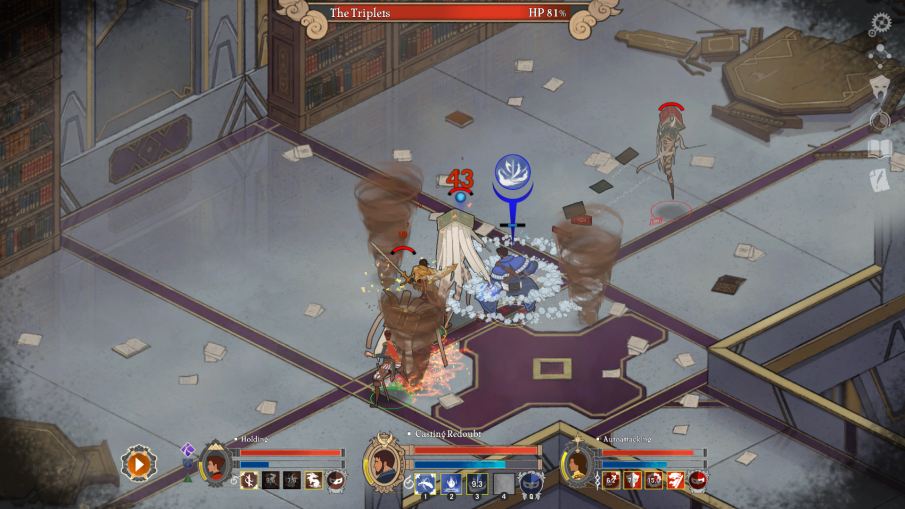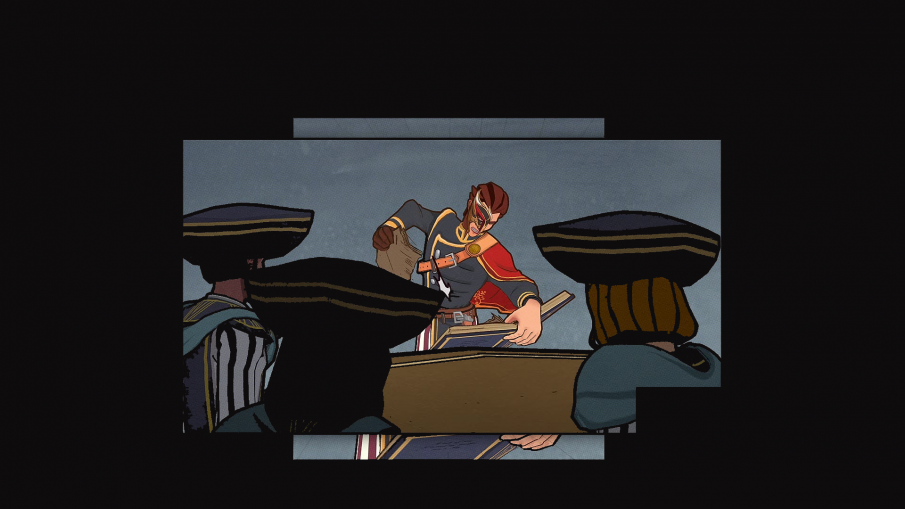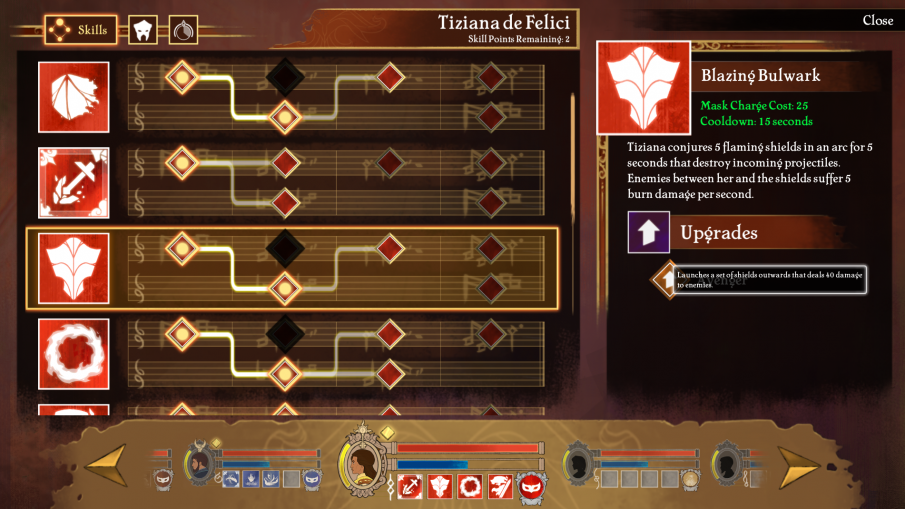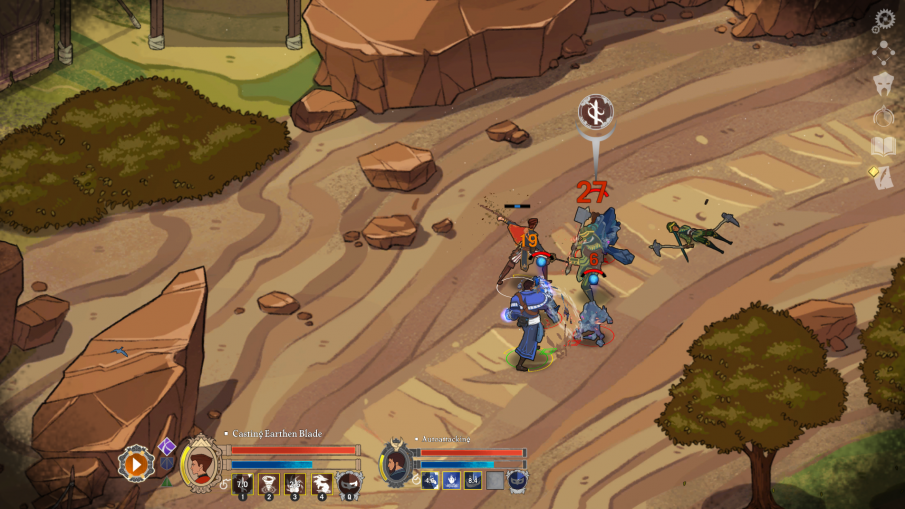PC, Xbox, Playstation, Switch •
Witching Hour Studios‘ Masquerada: Songs and Shadows had been sitting near the top of my Steam wishlist for about a year when I got around to it. You may know Witching Hour for their mobile and PC TBS Ravenmark: Scourge of Estellion, and if you don’t you should. Almost everything about the game intrigued me: the hand-drawn isometric art style, the highly developed and original fantasy setting, a plot that sounded like it just might actually explore tensions between the rich and poor with some subtlety, and the promise of tactical combat modeled on fencing.
There was just one problem: Masquerada isn’t turn based and I couldn’t even begin to follow the action in the trailer. It captured the fast-paced and decisive quality of the game’s magically-enhanced fencing, but even knowing that it was real-time with an “almighty” pause where you can issue orders in precisely the same vein as the Baldur’s Gate games, the frenetic action gave me, well, pause. My appreciation of FTL is based entirely on the game’s pausable real-time play: if I couldn’t pause it, I wouldn’t play it.
The bad news is that my concerns about the combat were partially valid. Individual strikes come fast but do little damage, whereas (energy and cooldown limited) special abilities can deliver a lot of pain, especially movement specials that can get you behind a foe’s guard to hit them with a second special. The pause feature works well, but the timing’s still finicky, and coordinating actions between characters is often best left to pointing them where you want them to go and leaving the rest to the AI. The AI’s pretty good, and you have quite a bit of control over how it plays your characters, setting conditions for use of specials, etc. I’m starting to wonder if I should just give up and let the AI fight itself.

Long story short, I wish the combat was turn-based. On the other hand, Masquerada really delivers on its promise to deliver a rich, original world, a compelling story, and nuanced, complex characters. Witching Hour took some significant steps in that direction with Ravenmark, but while that game’s tale of a reconquista was interesting and you got to play from multiple sides of the conflict, there was never any doubt who the good guys were or that the bad guys were bad people, and there were more than a few moments when the setting’s generic D&D origins were clearly visible beneath it’s El Cid versus the Roman Empire set dressing.
Not so in Masquerada: the game’s into/tutorial feels classically heroic, as you play Cyrus Gavar, leading a group of plucky rebels against soldiers of an oppressive regime, but… early-game spoiler warning… Cyrus is beaten and killed by a former friend. Thereafter, you play as Cyrus’ brother, Cicero. But you fell out with your brother over his plans to start a civil war, and it looks like you were right: his “freedom fighters” are starting to look more like “terrorists” and the only tangible consequences of his idealism are a large body count and the destruction of a huge number of Mascherines, ancient and irreplaceable magical masks.
You will meet your brother’s nemesis, and find him practical. You will talk about the good times with his killer. An honest man will lie to you, someone of unimpeachable honour will betray you, and it will turn out that you knew very little about a good friend, all in short order. This failure to conform to type could come across as inconsistent, but instead Masquerada’s characters are some of the most believably human I’ve seen in any game.

Masquerada’s setting is inspired by medieval Venice, the Citte della Ombre still a prosperous and beautiful city, despite the fighting, its styles sumptuous, its guilds wealthy, and the Mascherines stunning works of art, inspired by Venetian carnival masks. The game’s lore is deep and detailed but purely optional, with pop-ups informing you when there are new insights to be had. It works well as a way of slowly unfolding the world to a wide-eyed player, whereas Cicero already knows the ways of the Citte all too well.
For the true Inspettore, there are fascinating parallels between the Citte della Ombre and Witching Hour’s hometown of Singapore. Both are island city-states, wealthy and well respected, but with a large gap between the rich and the poor (almost, but not quite, as big a gap as the US), extremely powerful business interests, great religious, ethnic and cultural differences, and both have governments that vacilate between democratic, pragmatic and authoritarian approaches.

Singapore and the Citte are also too small and densely packed for it to be possible for anyone to “fly under the radar” for long. Witching Hour had a covert face-off with government censors, but not because it was too pointed: the censors objection was that the game contains a positive portrayal of homosexuality. There’s not so much as a queer kiss in the game, and it’s certainly not central to the game’s plot: it would have been easy to write it out, if Witching Hour hadn’t made it a priority. Though rated even with Denmark in terms of human development (life expectancy, education, and income), Singapore’s government exercises a lot of control over media, and “promotion and normalization” of homosexuality is a ban-able offense.
In short, having a likeable queer character who doesn’t come to a bad end is forbidden. That is exactly what Witching Hour did: one of Masquerada’s main characters is skilled, likeable, moral, and just happens to be gay… in a social context where, like in Singapore, homosexuality is highly stigmatized. The censors haven’t paid as much attention to games as they have to movies and music, but a game by a Singaporean studio wasn’t going to get an easy pass. In the end, it’s most likely Masquerada came out uncensored because of its visibility (as work by a successful Singaporean game studio) instead of despite it.
I’d love to see Witching Hour’s next game pair their now-mature storytelling skills with deep turn-based strategy, but I have no reservations about recommending Masquerada to anyone looking for a compelling original world and characters. You can get Masquerada on PC, Playstation and Xbox now, and it’s slated for release on Switch… soon-ish.
- Masquerada for PC via Steam, $20
- Masquerada for PC via GoG, $20
- Masquerada for Xbox, $20
- Masquerada for Playstation, $20



Start the discussion at discourse.statelyplay.com